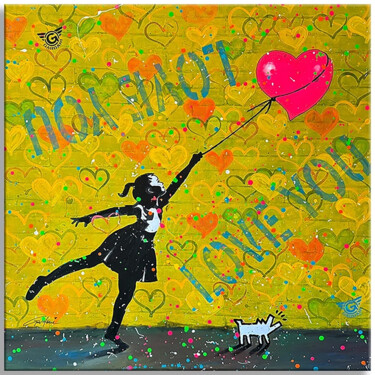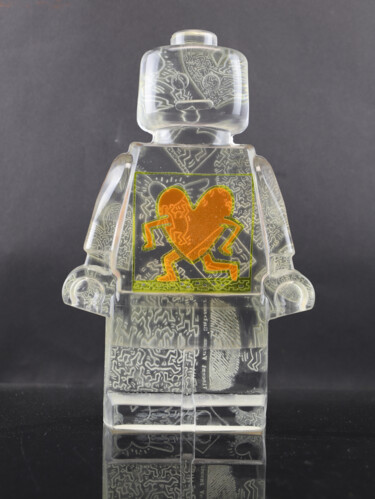40.704 Original Kunstwerke, limitierte Auflagen und Drucke:
Pop Art is a modern movement born in the middle of the 20th century in Great Britain which will take on a real dimension in the second half of the 20th century in the USA. It then becomes a real American movement. Andy Warhol is the most famous representative of this artistic movement.
Non-elitist, even popular art, it appropriates objects, references or everyday experiences in order to create a work of art. We find all forms of art (painting, sculpture, drawing, installation, etc.) in “non-traditional” Pop art. Artists do not hesitate to use new techniques as well as new supports.
What are the Influences behind Pop Art?
British artist Eduardo Paolozzi creates a collage of a pin-up girl with the Coca-cola brand logo and the word pop. The 1947 painting: "I was a rich Man's Plaything" is considered the first Pop painting in history. In 1952 the artists Richard Hamilton and Eduardo Paolozzi, Alison and Peter Smithson and the art critic Lawrence Halloway founded the group "Independent Group", precursors of the Pop art movement and will present their first exhibition.
The mass consumer society. After the Second World War and the rise of the consumer society, artists appropriated this new culture and put it forward in their creations like Andy Warhol with his boxes of Campbell soup.
From the 1950s and 1960s, pop music became a global phenomenon and inspired artists. Several album covers are made by Pop artists such as the cover of "Sgt. Pepper's Lonely Hearts Club Band" by the Beattles made by Peter Blake. Cinema is also becoming a real phenomenon and will inspire artists like Andy Warhol and his many versions of Marylin.
The explosion of American comics, particularly in the USA in the second half of the 20th century, would have a great influence on many artists such as Roy Lichtenstein, who produced many works that marked the Pop art artistic movement.
What are the techniques used in the artistic movement of pop art?
- The collage: The first works of Pop art are collages created by Eduardo Paolozzi. It is a characteristic method of this new artistic movement. Pasting was little used before. Pop artists use different materials for their collages: magazines, newspapers, posters, fabrics, paper, cardboard, plastics...
- Painting: Artists will favor new painting techniques such as acrylic paint which have just been developed by the chemical industry
- Screen printing: New industrial technique, it allows to reproduce an image in series. The principle of a single painting canvas disappears. Works of art can be reproduced dozens and dozens of times.
What are Famous Artists and Works?
Eduardo Paolozzi (1924-2005)
He is the precursor of pop art. Passionate about science fiction, his first artistic works are collages using advertising clippings using pin-ups or housewives to convey a message against the mass consumer society in his works of art. Paolozzi stayed in Paris, where he met the surrealists, Alberto Giacometti, but above all his interest in art brut made him meet Jean Dubuffet. These meetings will be decisive in the creation of this new form of art.
Peter Blake (1932-)
He created his first collages in 1955. At the start of the 1960s, the artist recovered and mixed the images that we find recurrently in his work: mythical characters, stars of sport, cinema or music. Peter Blake created in 1957, one of the first known works of Pop art: “On the balcony”. The work is now in the collections of Tate Britain museum in London.
Richard Hamilton (1922-2011)
Painter and co-worker, Hamilton is one of the first creators of Pop art. Hamilton is heavily influenced by the works of James Joyce and Marcel Duchamp. He focuses his work on popular culture, mass-produced, youthful and glamorous.
The British artist's collage “Just what is it that makes today's homes so different, so appealing? created in 1956 is in the collections of the Kunsthalle, in Tübingen (Germany).
Andy Warhol (1928-1987)
The emblematic artist of Pop art Andy Warhol (real name Andrew Warhola), born in Pittsburgh, Pennsylvania and died in New York in 1987. He painted in New York in 1961 works of art inspired by American comics. (Advertisement, Before and After, Little King, Saturday's Popeye and Superman). In 1962 Warhol presented a diptych by Marylin Monroe a few months after the artist's death. Fascinated by the silkscreen reproduction process. A technique that was to become Warhol's recognizable style, both simple and quick. The photo of Marylin selected by Warhol is taken from the film "Nigeria", in which Marilyn had played in 1953. The model will be used by him to create many works of art with this image of Marylin that everyone knew.
In 1963 he created "Silver Car Crash (Double Disaster)" From 1965 he worked with many assistants in his New York studio the Factory. The Pop art style somehow barely existed before Warhol became interested in it.
Roy Lichtenstein (1923-1997)
In 1961 Roy Lichtenstein began to paint his first pop works inspired by cartoons and with techniques inspired by the appearance of commercial advertisements, such as "Look Mickey!" Which is now on display at the National Gallery of Art, Washington, DC In the USA.
In 1961, Leo Castelli began presenting his first exhibition of Lichtenstein's work at his New York gallery and he had his first solo exhibition at the gallery, in 1962.
Many other artists are also known for their involvement in the pop art movement such as Robert Rauschenberg, Valerio Adami, John Alcorn, Allan D'Arcangelo, Keith Haring, David Hockney, Jasper Johns, Ed Ruscha...
At the same time in France, influenced by the Pop wave, a particular art movement was developing: “new realism”. The artists will use everyday objects not as "icons" but as components of the work itself. This is the beginning of the use of industrial materials such as concrete, prefabricated sheets, cans...
The artistic movement is marked by the artists Arman, François Dufrêne, Raymond Hains, Yves Klein, Jean Tinguely, Jacques Villeglé or Gérard Deschamps.
Pop art today or "neo pop art"
The artists Murakami, Koons or Hirst are emblematic of the contemporary Pop art trend. Extremely popular Takashi Murakami even collaborates with luxury brands like Louis Vuitton. The "kitsch" balloon sculptures of Jeff Koons, such as the Balloon dog have become symbols known to all.
The works of Fabien Novarino mixing collages, painting, stencils... are a tribute to the culture of entertainment.
What are the defining quotes of the Pop art art movement?
Eduardo Paolozzi
"I don't want to," he said in a conversation with writer JG Ballard and critic Frank Whitford, published on the occasion of his premiere.
major retrospective at the Tate Gallery by the magazine Studio International in October 1971, making images that help people escape from this terrible world. I want to remind them."
Peter Blake
“We are not consciously avant-garde, in front of others. We discover and try to find paths, and two years later, when someone follows the same path, it becomes clear that we were ahead of the others. But, on the other hand, we sometimes try to stay consciously in the background or go back ten years. I tend to play this game, “swimming against the tide”, sometimes consciously and sometimes unconsciously.
Richard Hamilton
“Pop Art: Popular, provisional, disposable, cheap, mass-produced, young, funny, sexy, clever, spectacular and very profitable.”
Andy Warhol
“I like boring things. I like things to be exactly the same over and over again.”
"All boards should be the same size and color so that they would be interchangeable and no one would feel like they had a good one or a bad one."
"Bad taste makes time pass faster."
Roy Lichtenstein
"What marks pop is above all the use it makes of what is despised and it insists on the most practical, the least aesthetic, the most bellowing aspects of advertising."
"Clichés are simple patterns that are striking, memorable, and easy to communicate. They can signify the gist of an idea. They have the potential to become monumental."
Entdecken Sie originelle zeitgenössische Pop-Art-KunstWerke auf ArtMajeur
Zeitgenössische Pop Art ist eine lebendige und expressive Kunstform, die in den letzten Jahren zunehmend beliebt geworden ist. Diese Art von Kunstwerken zeichnet sich durch ihre kräftigen Farben, markanten Bilder und ihre Verwendung von Referenzen aus der Popkultur aus. Künstler verwenden eine Vielzahl von Materialien wie Leinwand, Papier und Holz und setzen Techniken wie Siebdruck, Digitaldruck und Collage ein. Was die Pop Art wirklich einzigartig macht, ist ihre Fähigkeit, das Wesen unserer modernen Welt zu erfassen und uns die Bilder und Themen zu spiegeln, die unsere Kultur definieren.
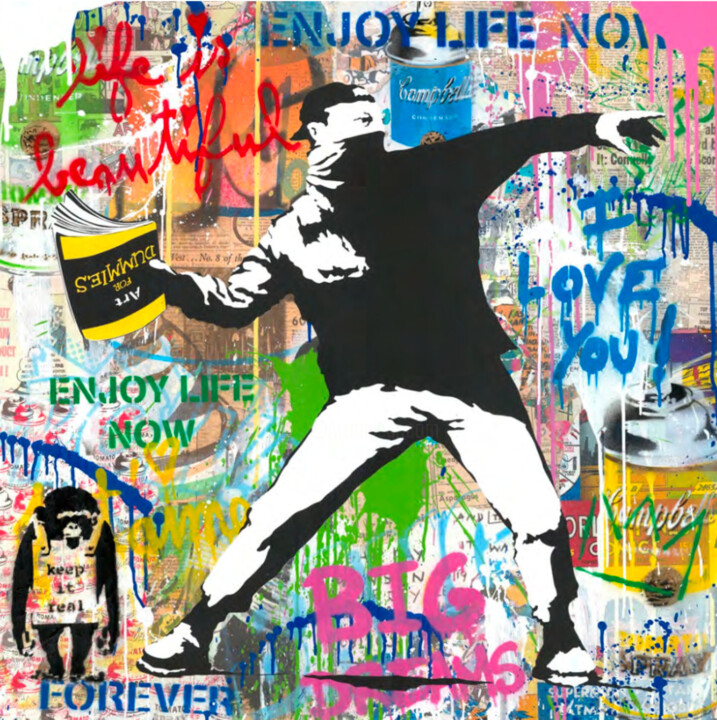
©2022 Mr. Brainwash Künstler von ArtMajeur by YourArt vertreten
Ursprung und Geschichte
Pop Art, eine Bewegung aus den mittleren 1950er Jahren in Großbritannien und Amerika, entstand als Reaktion gegen die vorherrschenden künstlerischen Stile der Zeit. Es versuchte, die Kluft zwischen hoher und niedriger Kunst zu überbrücken, indem es populäre Kultur und Alltagsgegenstände in seine Werke integrierte. Zu den Schlüsselfiguren der Bewegung gehörten Andy Warhol, Roy Lichtenstein und Richard Hamilton.
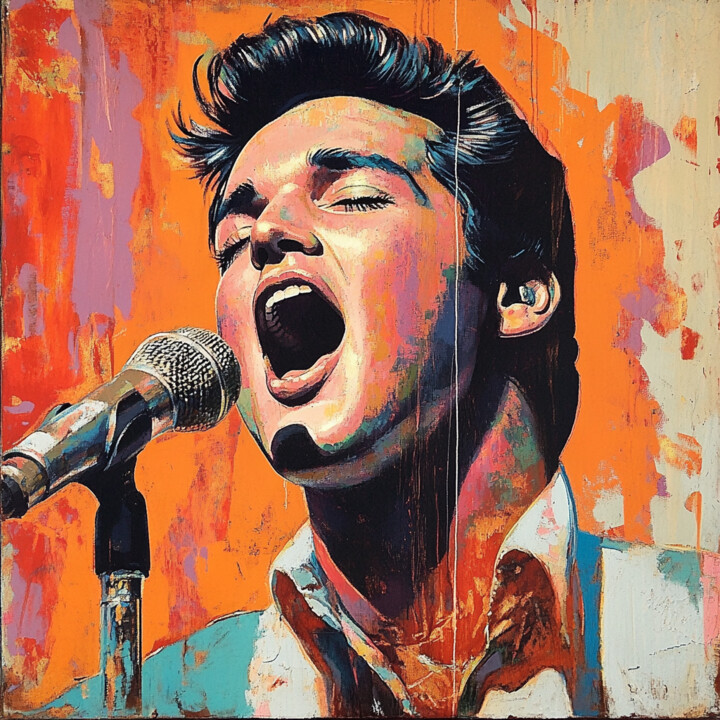
©2025 Yass
Entwicklungen dieser Werke auf dem zeitgenössischen Kunstmarkt
In den letzten Jahren hat die originale zeitgenössische Pop-Art eine faszinierende Entwicklung durchgemacht. Diese Kunstform hat ihre Wurzeln in den 1950er und 1960er Jahren, als Künstler wie Andy Warhol und Roy Lichtenstein die Verwendung von populären Kultur-Bildern in ihren Werken begründeten. Heute zeichnet sich die zeitgenössische Pop-Art durch ihren kühnen Einsatz von Farbe, grafischen Mustern und verspielten Kompositionen aus. Diese Kunstwerke sind auf dem zeitgenössischen Kunstmarkt immer beliebter geworden und werden weltweit von Sammlern gesucht. Was sie so wichtig macht, ist ihre Fähigkeit, den Geist unserer Zeit einzufangen und die kulturellen und sozialen Trends des Augenblicks widerzuspiegeln.
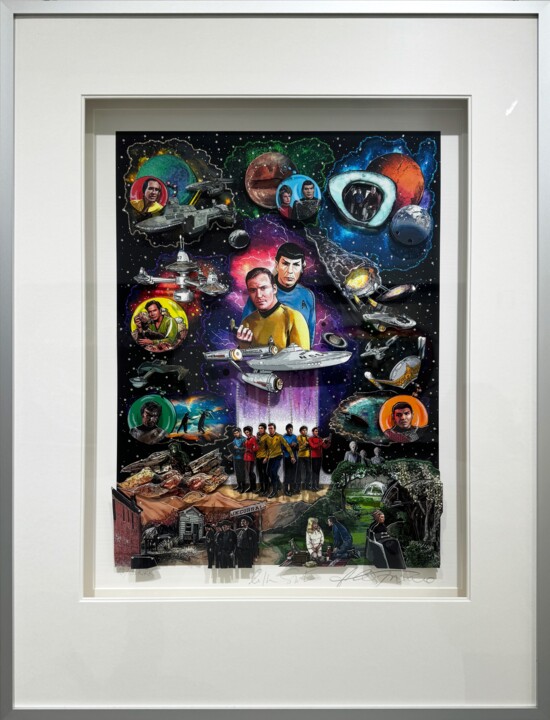
©2018 Charles Fazzino Künstler von Tilsitt Gallery vertreten
Verwandte berühmte Künstler
Zeitgenössische Pop-Art ist eine Bewegung, die die Kunstwelt im Sturm erobert hat. Sie zeichnet sich durch leuchtende Farben, kühne Linien und ein Gefühl der Verspieltheit aus. Hier sind einige der Top-Künstler in diesem Genre:
Takashi Murakami - Dieser japanische Künstler ist bekannt für seine lebendigen, cartoonartigen Gemälde und Skulpturen. Seine Arbeit zeigt oft lächelnde Blumen, von Anime inspirierte Charaktere und Anspielungen auf die japanische Kultur.
Jeff Koons - Koons ist ein amerikanischer Künstler, der für seine übergroßen Skulpturen von Alltagsgegenständen wie Ballontieren und riesigen aufblasbaren Blumen berühmt ist. Seine Arbeit wird oft dafür kritisiert, kommerziell zu sein und an Tiefe zu fehlen, aber er bleibt einer der bekanntesten Pop-Art-Künstler heute.
Damien Hirst - Hirst ist ein britischer Künstler, der für seine kontroversen Werke bekannt ist, wie zum Beispiel ein in Formaldehyd konservierter Hai und ein diamantenbesetzter Schädel. Seine Arbeit erkundet oft Themen wie Tod und Sterblichkeit, und er gilt als einer der erfolgreichsten lebenden Künstler.
Yayoi Kusama - Kusama ist eine japanische Künstlerin, die für ihre farbenfrohen, gepunkteten Installationen und Skulpturen berühmt ist. Ihre Arbeit erkundet oft Themen wie Weiblichkeit, Sexualität und psychische Erkrankungen.
Banksy - Banksy ist ein anonymer britischer Straßenkünstler, der für seine politischen und sozialen Kommentare bekannt ist. Seine Arbeit zeigt oft gesprayte Bilder von Ratten, Polizisten und anderen symbolträchtigen Symbolen, und er hat eine Kultanhängerschaft für seine provokative und zum Nachdenken anregende Kunst gewonnen.
Diese Künstler haben alle bedeutende Beiträge zur Welt der Pop-Art geleistet, und ihre Werke inspirieren und faszinieren weiterhin Zuschauer auf der ganzen Welt. Ob Sie ein eingefleischter Fan oder ein gelegentlicher Beobachter sind, es gibt kein Bestreiten des Einflusses, den die Pop-Art auf die zeitgenössische Kultur hatte.

©2025 Gardani
Bemerkenswerte originale zeitgenössische Pop-Art-Kunstwerke
Pop Art ist eine beliebte Kunstbewegung, die in den 1950er Jahren entstanden ist. Sie feiert Massenkultur, Konsumismus und den Alltag. Hier sind einige bekannte zeitgenössische Pop-Art-Kunstwerke:
"Campbell’s Soup Cans" von Andy Warhol, erstellt im Jahr 1962, zeigt zweiunddreißig Dosen Campbell-Suppe in einem Raster. Das Kunstwerk ist ein Kommentar zur Massenproduktion und zum Konsumismus.
"Marilyn Diptych" von Andy Warhol, erstellt im Jahr 1962, ist ein Siebdruckgemälde von Marilyn Monroe. Das Kunstwerk ist eine Hommage an die Schauspielerin und eine Erkundung ihres Ruhms und ihres tragischen Todes.
"Whaam!" von Roy Lichtenstein, erstellt im Jahr 1963, zeigt ein Kampfflugzeug, das eine Rakete abfeuert. Das Kunstwerk basiert auf einem Comic-Buch-Panel und ist ein Kommentar zum Krieg und zur Gewalt.
"Love" von Robert Indiana, geschaffen im Jahr 1966, ist eine Skulptur des Wortes "Liebe" in fettgedruckten Buchstaben. Das Kunstwerk ist zu einem ikonischen Symbol der Pop-Art-Bewegung geworden und wurde in verschiedenen Formen reproduziert.
"Banana" von Andy Warhol, erstellt im Jahr 1967, ist ein Siebdruck einer Banane auf einem gelben Hintergrund. Das Kunstwerk ist eine verspielte Interpretation von Werbung und kommerzieller Verpackung.
"Flag" von Jasper Johns, erstellt in den Jahren 1954-55, ist ein Gemälde der amerikanischen Flagge. Das Kunstwerk ist eine Aussage über Patriotismus und die Rolle des Künstlers in der Gesellschaft.
Diese Kunstwerke sind zu ikonischen Symbolen der Pop-Art-Bewegung geworden und inspirieren auch heute noch Künstler. Sie feiern das Alltägliche und fordern traditionelle Vorstellungen von Kunst heraus.

Gardani
Skulptur - Harz | 9x21 in

Gardani
Acryl auf Leinwand | 49x39 in

Gardani
Öl auf Leinwand | 58x58 in

Gardani
Acryl auf Leinwand | 39x39 in
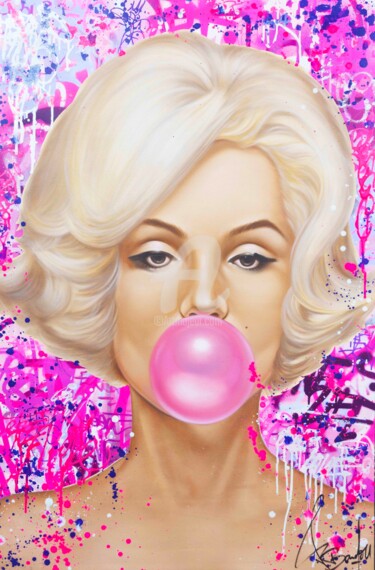
Vincent Bardou
Acryl auf Leinwand | 47,2x31,5 in
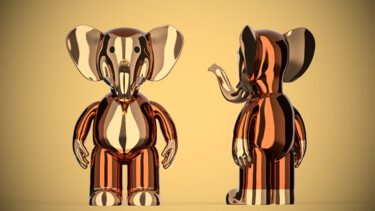
Vincent Faudemer
Skulptur - Harz | 19,7x7,9 in

Gardani
Acryl auf Leinwand | 39x49 in

Gardani
Skulptur - Giesserei | 19,5x15,5 in

Gardani
Acryl auf Leinwand | 39x39 in
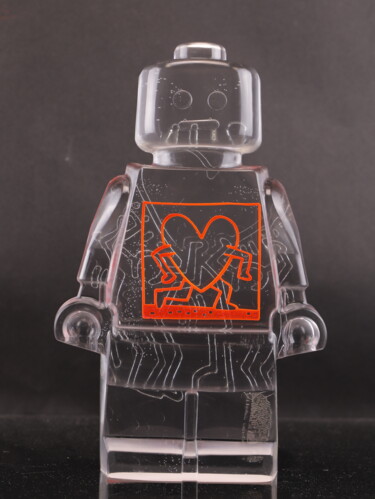
Vincent Sabatier (VerSus)
Skulptur - Harz | 9,8x6,3 in
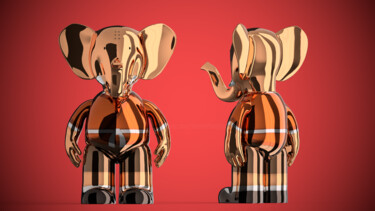
Vincent Faudemer
Skulptur - Harz | 19,7x7,9 in

Charles Fazzino
Skulptur - Karton | 20,3x15 in
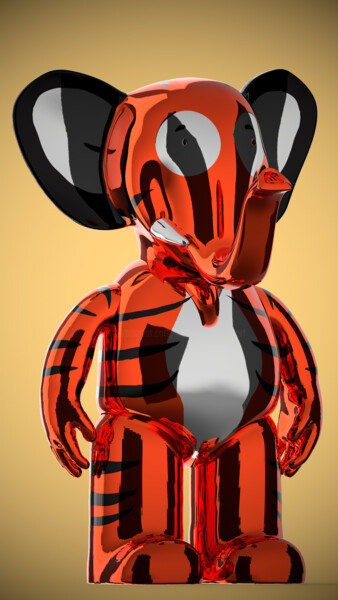
Vincent Faudemer
Skulptur - Harz | 19,7x7,9 in
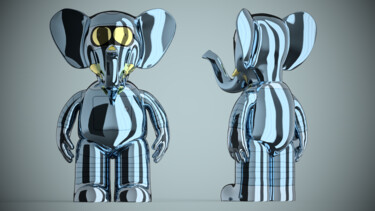
Vincent Faudemer
Skulptur - Harz | 19,7x7,9 in
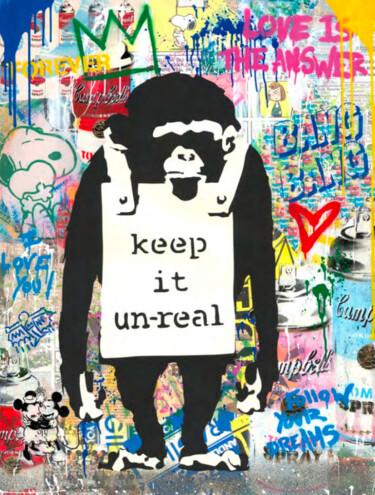
Mr. Brainwash
Schablone auf Papier | 50x37,8 in

Gardani
Skulptur - Harz | 17x17 in
